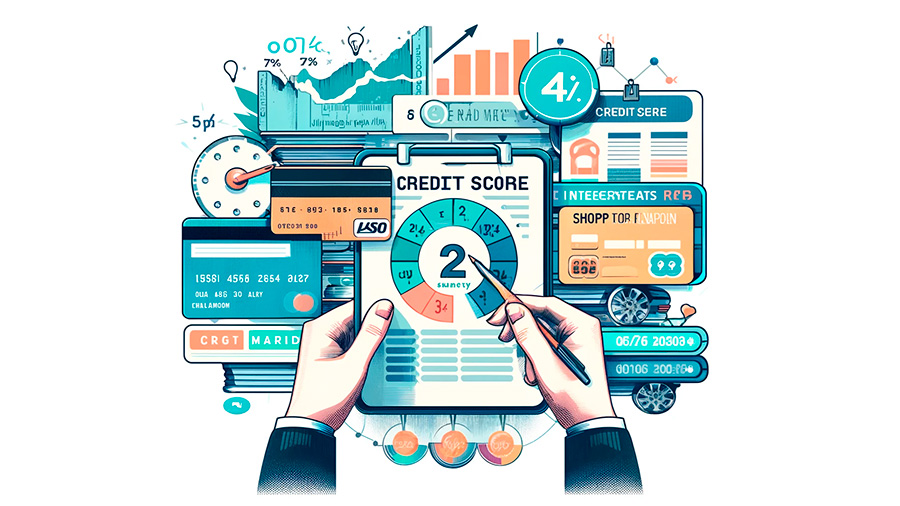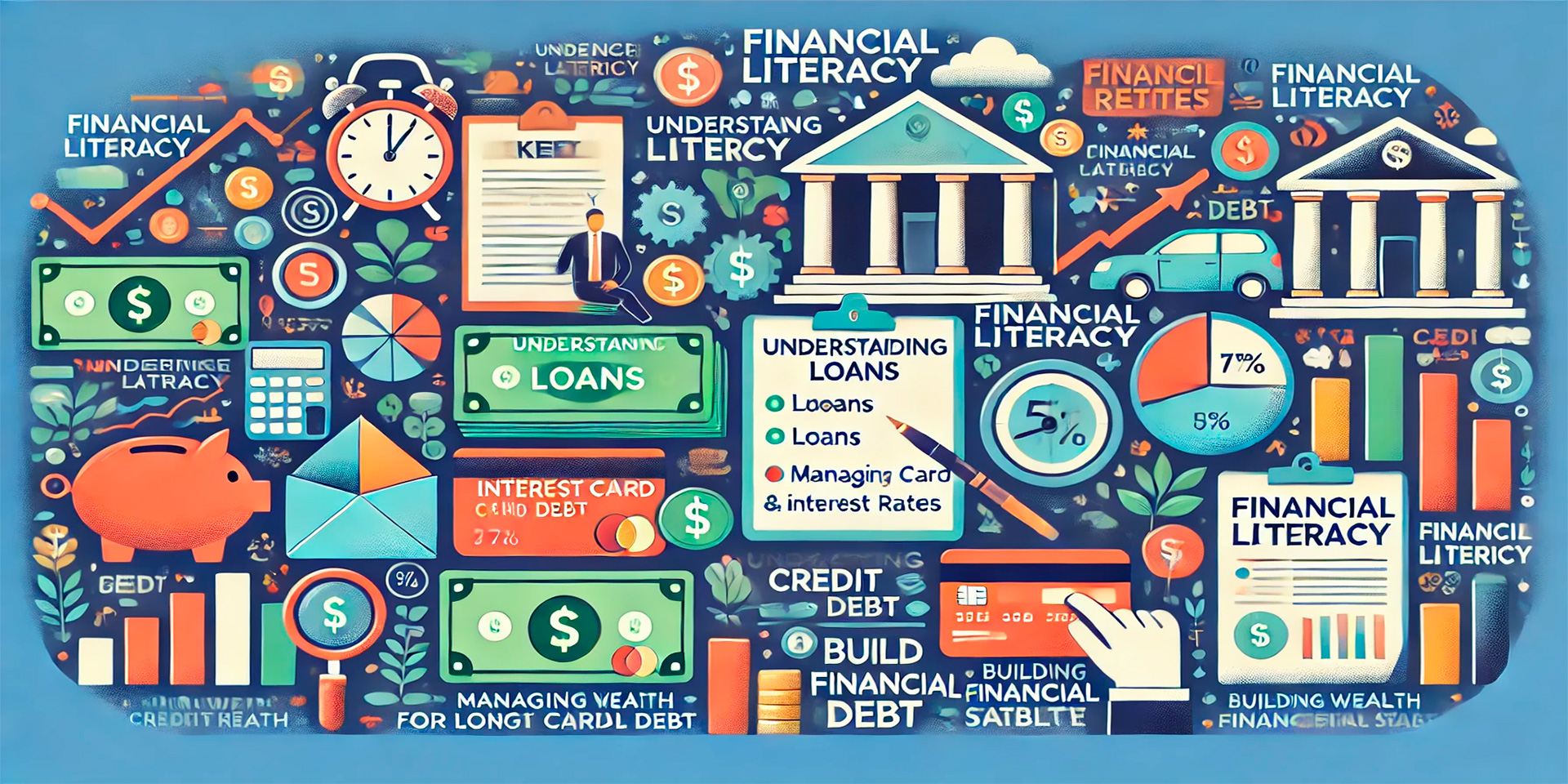Financial literacy is the cornerstone of smart credit management. It equips you with the knowledge and skills needed to make informed decisions about your finances, particularly when it comes to credit, loans, and interest rates. By understanding how these elements work together, you can avoid common financial pitfalls, build wealth, and achieve long-term financial stability.
In today’s complex financial landscape, being financially literate is more important than ever. Whether you’re applying for a loan, managing credit card debt, or planning for future investments, a solid foundation in financial literacy will help you navigate these decisions with confidence. This guide will introduce you to the basics of financial literacy and show you how to apply this knowledge to manage your credit effectively.
What Is Financial Literacy?
Financial literacy refers to the understanding of various financial concepts, including budgeting, saving, investing, credit management, and the impact of interest rates. It’s about knowing how to manage your money, make informed decisions, and plan for the future. Financial literacy enables you to understand the terms and conditions of financial products, recognize the risks and benefits, and choose the best options for your individual situation.
At its core, financial literacy is about being able to make decisions that will enhance your financial well-being. This involves not only managing day-to-day expenses but also planning for larger financial goals, such as buying a home, saving for retirement, or investing in education. With a strong foundation in financial literacy, you can take control of your financial future and make choices that lead to long-term success.

The Basics of Credit Management
Credit management is a key component of financial literacy. It involves understanding how credit works, how to use it responsibly, and how to maintain a strong credit history. Effective credit management can help you avoid debt, improve your credit score, and access better financial opportunities, such as lower interest rates and higher credit limits.
One of the most important aspects of credit management is understanding your credit score. Your credit score is a numerical representation of your creditworthiness, based on your credit history. It influences your ability to obtain loans, the interest rates you’re offered, and even your ability to rent an apartment or secure a job. By knowing your credit score and the factors that affect it, you can take steps to improve it, such as paying bills on time, reducing debt, and avoiding unnecessary credit inquiries.
Another critical element of credit management is understanding interest rates. Interest is the cost of borrowing money, and it can significantly impact the total amount you pay over the life of a loan or credit card balance. By shopping around for the best interest rates and avoiding high-interest debt, you can save money and keep your finances on track.
Building a Strong Financial Foundation
Building a strong financial foundation begins with creating a budget. A budget helps you track your income and expenses, ensuring that you live within your means and allocate funds toward your financial goals. It’s also a valuable tool for managing debt and saving for the future. A well-structured budget should include all sources of income, fixed and variable expenses, and savings for emergencies and future investments.
Saving is another crucial aspect of financial literacy. Having a savings plan allows you to prepare for unexpected expenses and build a financial cushion that can help you avoid relying on credit in times of need. An emergency fund, typically covering three to six months of living expenses, is a key component of financial stability. Additionally, saving for long-term goals, such as retirement or a down payment on a home, requires discipline and planning, both of which are integral to financial literacy.
Investing is a more advanced aspect of financial literacy, but it’s essential for long-term wealth building. Understanding the basics of investing, such as the difference between stocks, bonds, and mutual funds, and knowing how to assess risk, can help you make informed decisions that grow your wealth over time. The earlier you start investing, the more time your money has to grow through compound interest, which can significantly increase your financial security in the future.

Applying Financial Literacy to Credit Decisions
Financial literacy is particularly important when making decisions about credit. Whether you’re applying for a new credit card, taking out a loan, or refinancing existing debt, being financially literate helps you understand the terms and conditions, calculate the true cost of borrowing, and choose the best option for your situation.
Before taking on any new credit, it’s essential to assess your current financial situation and determine whether you can afford the additional debt. This involves reviewing your budget, considering your income stability, and evaluating your existing debt load. If you decide to proceed, compare offers from multiple lenders to ensure you’re getting the best interest rate and terms.
Understanding the impact of interest rates on your credit decisions is also crucial. For example, if you’re considering transferring a balance from a high-interest credit card to one with a lower rate, it’s important to calculate the savings and factor in any fees. Similarly, when taking out a loan, understanding how different loan terms (such as fixed vs. variable rates or short vs. long terms) affect your payments and overall cost can help you make a more informed choice.
Maintaining Financial Health Through Education
Financial literacy is not a one-time lesson; it’s an ongoing process of learning and adapting to changes in your financial life and the broader economy. Regularly reviewing your financial situation, staying informed about changes in interest rates and credit policies, and continuing to educate yourself on personal finance topics are all essential for maintaining financial health.
There are many resources available to help you improve your financial literacy, including books, online courses, and financial advisors. By taking the time to enhance your understanding of financial concepts, you can make more informed decisions, avoid costly mistakes, and build a secure financial future.
Conclusion
Financial literacy is the foundation of smart credit management and overall financial success. By understanding key concepts such as budgeting, saving, investing, and credit management, you can make informed decisions that protect your financial health and help you achieve your goals. Whether you’re managing day-to-day expenses, planning for long-term investments, or navigating the complexities of loans and interest rates, financial literacy empowers you to take control of your financial future. Start building your knowledge today and enjoy the benefits of greater financial stability and confidence.

